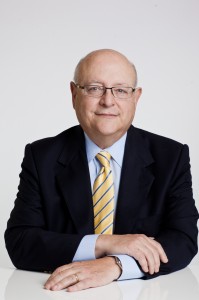"At the time of his appointment in 2008, the salary was below the median salary ($644,900) of leaders of similar public and private universities used by the California Postsecondary Education Commission for comparison purposes," according to a university news release.
In 2009, Deborah Solomon of The New York Times asked if university presidents shouldn't make less than the $400,000 a year earned by the president of the United States.
Will you throw in Air Force One and the White House?" Yudoff responded.
Yudoof issued the following statement about his retirement:
I have decided to bring to a close my tenure as President of the University of California, effective August 31, 2013. While the decision is my own, the moment comes with a mixture of emotions. For a transplant from Texas, by way of Philadelphia and Minnesota, every day at the University of California has brought new wonders.
UC remains the premier public university system in the world, and I was both honored and humbled to serve as its president for what has been nearly five years now. I will miss my daily interactions across the system with so many dedicated, capable, and intellectually stimulating people.
Over the past few months, however, and after careful consultation with my family, it has become clear to me that the time has come for me to step away and return to the teaching of law on the Berkeley campus. The prior 18 months brought a spate of taxing health issues. Though these challenges have been largely overcome, I feel it is time to make a change in my professional lifestyle.
Beyond personal considerations, this also appears to be an apt time for the University to bring in fresh leadership. When I arrived in 2008, the economy had begun to unravel and state coffers were tumbling deep into the red. With its budget slashed, the University was presented with one of the most severe challenges in its history.
Now, it appears the storm has been weathered. We are not fully in the clear, but we are much closer than we were even a few months ago. I look forward to working closely in the months ahead with Governor Brown, Assembly Speaker Perez, Senate President Pro Tem Steinberg and other state leaders to ensure that the University is positioned to continue on this forward course, which ultimately will benefit all Californians.
It is important to note that we – members of the entire UC community—have made it through this rough passage with our fundamental attributes intact. We have preserved excellence in our academics, research and health care. We have kept our doors open to all worthy students, regardless of family income levels, embracing the Blue and Gold financial aid program for low and middle income students and raising more than $671 million through the Project You Can scholarship program.
Many, many people contributed to this remarkable achievement: employees, including tenured faculty, who accepted without complaint a furlough program that cut into their paychecks; students and their families, who endured rising tuition rates; administrators and staff, who worked with great vigor and creativity to carve out savings through improved efficiencies, and California voters, who finally agreed that the cuts needed to stop and brought relief last November by approving Proposition 30. I applaud and am thankful for all of these contributions.
I also would be remiss not to express my gratitude to the Regents. Throughout, they have provided the leadership and unwavering support needed for the University to face down this crisis. I was privileged to serve under three gifted Board chairs: Richard Blum, Russell Gould, and Sherry Lansing. I will leave it to others to judge what difference my leadership made, if any, but I will say that I entered each day with a laser focus on preserving this great public treasure, not just in the present day, but for generations of Californians to come. And in the end, what matters most is what still remains: a vibrant public university system, the envy of the world, providing California with the beacon of hope and steady infusion of new thinking that are necessary for any society to flourish.
